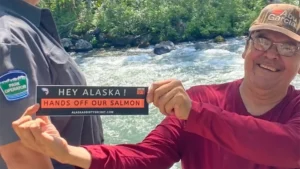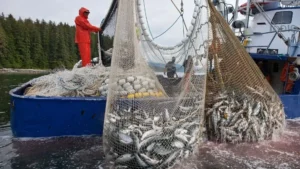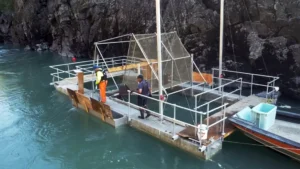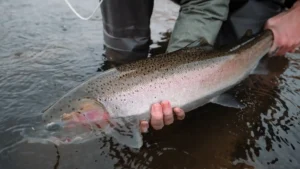Tag: Sustainable Fisheries
Alaska salmon fishery objection dismissal ‘seriously undermines’ MSC credibility
Alaska salmon fishery objection dismissal ‘seriously undermines’ MSC credibility Watershed Watch, Raincoast Conservation and SkeenaWild’s objection to SE Alaskan fisheries’ sustainable rating was rejected this week. Raincoast Conservation Foundation, SkeenaWild Conservation Trust, and Watershed Watch Salmon Society are speaking out against an adjudicator’s decision to uphold the Marine Stewardship Council’s (MSC) misleading certification of the […]
B.C. NGOs head to Seattle for final step in their objection to the certification of southeast Alaska salmon fisheries
B.C. NGOs head to Seattle for final step in their objection to the certification of southeast Alaska salmon fisheries Alaska’s fisheries should not be accredited with Marine Stewardship Council’s sustainability check mark when these fisheries harm B.C.’s wild salmon and killer whales Tomorrow, Raincoast Conservation Foundation, SkeenaWild Conservation Trust and Watershed Watch Salmon Society will […]
The Future Is Selective
The Future Is Selective This summer, B.C. salmon fishing has offered a glimpse into a sustainable future. In the Skeena, fisheries have opened with strong returns for species like pink, sockeye, and steelhead. Although warm water and low levels posed challenges, the resilience of the fish and innovative fishing techniques provided a hopeful outlook. The […]
Defend Skeena Steelhead From Alaska’s Nets
Unsustainable net fisheries are the largest source of mortality for steelhead bound for the Skeena River – especially when those fish are released dead.
Ocean Wise pulls sustainability recommendation for southeast Alaska salmon
Watershed Watch Salmon Society, SkeenaWild Conservation Trust, and Raincoast Conservation Foundation are very pleased that Vancouver-based eco-label Ocean Wise has removed salmon harvested in southeast Alaska from its list of recommended sustainable seafood products.
New Recommendations from Ocean Wise Recognize Sustainable B.C. Salmon Fisheries
Consumers want to buy sustainably caught seafood but for too long have been hampered by eco-labels that greenwash harmful industrial fisheries and exclude smaller-scale sustainable fisheries. This has especially been the case for Pacific salmon, where community-led Indigenous fisheries in British Columbia have been passed over by major ecolabels, while unsustainable interception fisheries in Alaska have enjoyed long-standing approval.
Skeena 2024 Pre-Season Conditions and Forecast : How is it Affecting Wild Salmon?
Let’s take a look at what we’re expecting to see with salmon returns to the Skeena this summer. Here we cover pre-season forecasts, as well as some of the marine and freshwater conditions from the past five years that may influence this year’s salmon returns. In general, pre-season forecasting has become less accurate in recent years due to greater environmental variability – which is why we at SkeenaWild continue to advocate for sustainable fisheries with in-season monitoring and adaptability to in-season abundances and conditions.
Marine Stewardship Council to review Canadian conservation groups’ objections to Alaskan salmon “sustainable” certification
An independent adjudicator has accepted the formal objection of three B.C.-based conservation organizations to the certification of Alaskan salmon as “sustainable” by the UK-based Marine Stewardship Council
B.C. conservation organizations fight Alaskan salmon “sustainable” certification
British Columbia conservation organizations SkeenaWild Conservation Trust and Raincoast Conservation Foundation, along with Watershed Watch Salmon Society, have filed a formal notice of objection with the U.K.-based Marine Stewardship Council in response to the proposed re-certification of Alaskan salmon fisheries as sustainable.
Alaska’s Dirty Secret: Send sustainable seafood verifiers a message
Fishers in Southeast Alaska intercept and sell millions of salmon and steelhead migrating to British Columbia, Washington and Oregon in non-selective net fisheries that don’t adequately report their bycatch. All while our local fisheries are closed to rebuild dwindling stocks.



